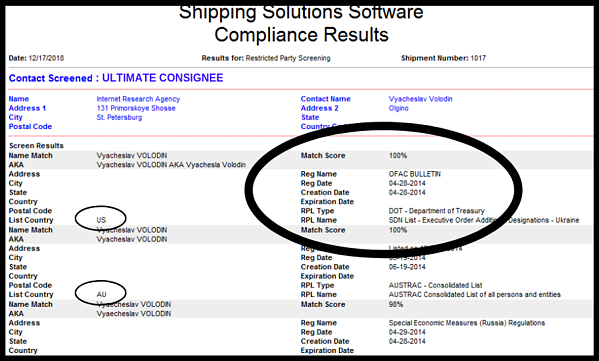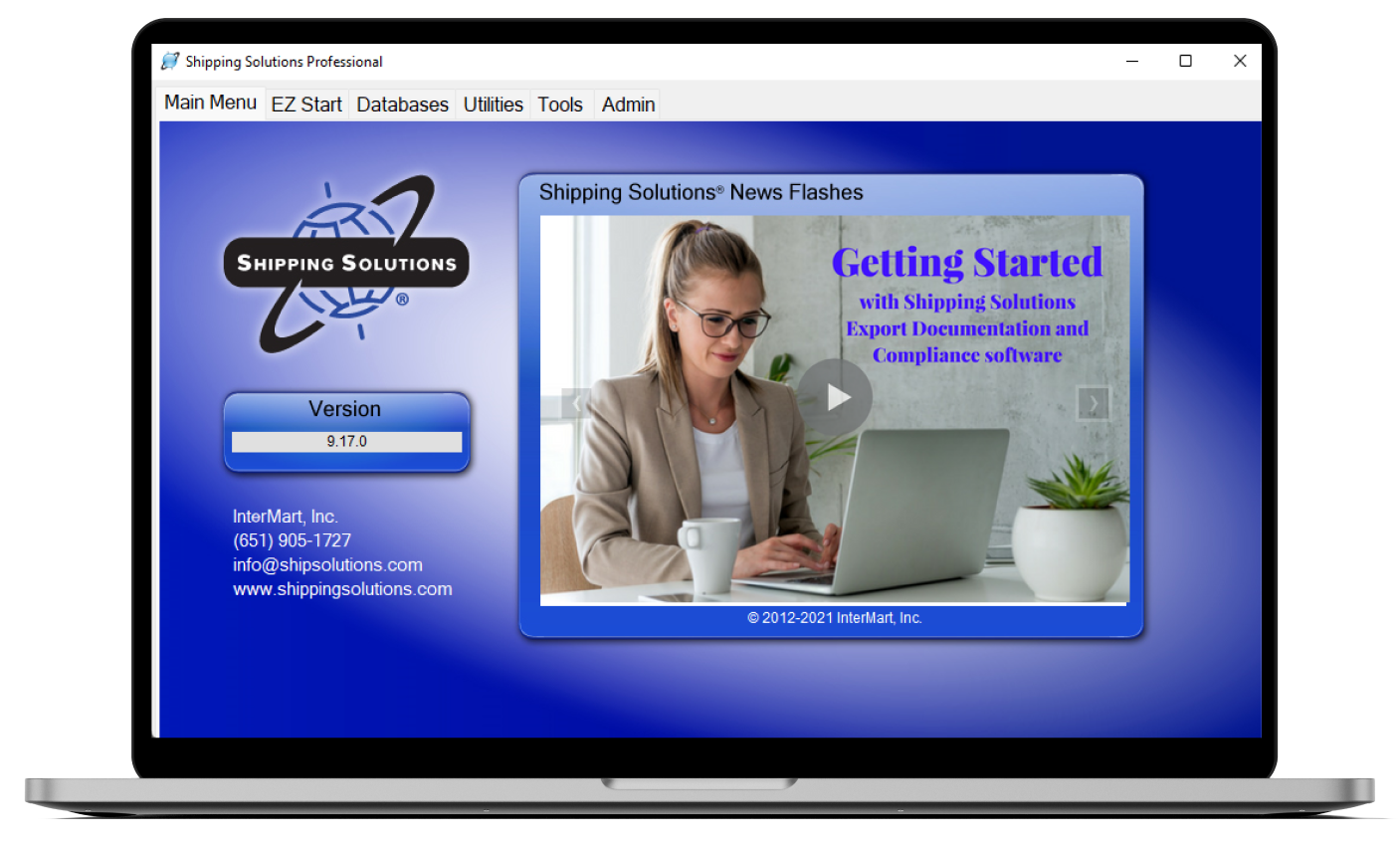The International Trade Blog International Sales & Marketing
What Is Denied Party Screening?
On: June 19, 2024 | By:  David Noah |
6 min. read
David Noah |
6 min. read

Denied party lists (or restricted party lists) identify the organizations, companies or individuals that various U.S. agencies—and other foreign governments—have identified as parties that one shouldn’t do business with because they may be a terrorist organization, may be affiliated with terrorist organizations, have a history of corrupt business practices or may pose a threat to national security.
Exporters should check denied party lists for every single export transaction. This is accomplished through denied party screenings.
What Is a Denied Party Screening?
A denied party screening refers to the process by which a company checks a potential customer or business partner against one or more of the dozens of restricted party lists to ensure it is not about to do business with a restricted party. A denied party screening is also often referred to as a restricted party screening.
What’s the difference between denied party screening and restricted party screening?
Denied party screenings and restricted party screenings are the same exact process, and the terms can be used interchangeably for most purposes. However, there are a few things that distinguish denied parties from restricted parties.
Denied parties, called denied persons by the U.S. Bureau of Industry and Security (BIS), are “individuals and entities that have been denied export privileges. Any dealings with a party on this list that would violate the terms of its denial order are prohibited” based on Section 764.3(a)(2) of the U.S. Export Administration Regulations (EAR). Learn more here: How to Respond to a Denied Party Screening Match.
Restricted parties may face whole or partial export privilege prohibition. According to Descartes Visual Compliance, restricted parties—unlike denied parties—may be prohibited from receiving some items subject to the EAR; a license may be required to conduct business with them, or it may be prohibited to transact with them altogether.
Lists Checked in a Denied Party Screening
To ensure compliance with export regulations, companies should conduct a denied party screening search on every export transaction. The denied party screening lists that companies should check include the Consolidated List, as well as more than 140 lists from these government departments and agencies:
- Commerce Department
- State Department
- Treasury Department
- Justice Department
- Department of Homeland Security
- Defense Department
- Other federal and state government agencies
Penalties for Noncompliance
Noncompliance with export regulations may significantly impact your ability to conduct future transactions, as you could be subject to a steep monetary penalty and potentially even jail time.
- According to the BIS, fines for export violations can reach up to $1 million per violation in criminal cases.
- Administrative cases may result in a penalty amounting to the greater of $250,000 or twice the value of the transaction.
- In addition, criminal violators may be sentenced to prison for up to 20 years, and administrative penalties may include denial of export privileges.
Think you’re too small to get noticed violating these regulations? Think again. Small- and medium-sized exporters are liable, too—with compliance, there’s no such thing as “too small to be noticed.” All companies must exercise due diligence to meet export-control responsibilities.
How to Perform Denied Party Screenings
With so much at stake and so many lists to check, you need a plan in place for performing denied party screenings.
Who should be screened?
All entities that you do business with throughout an international transaction should be screened—including, but not limited to, vendors, suppliers, resellers, customers, end users, service providers, freight forwarders, customs brokers, recipients of software and technical data, and banks and financial institutions.
When should you screen?
Screen several times throughout your business relationship with a party, but especially before an order is shipped or money changes hands. Even if you’ve worked with the same business partner for years, be sure to rescreen before every new transaction.
Using Shipping Solutions Software for Denied Party Screenings
Exporters can choose to manually check all 140+ lists for every single expert transaction, or they can use software that is specifically designed to simplify the denied party screening process, like Shipping Solutions. Here’s how easy it is:
The Compliance Module in Shipping Solutions Professional export documentation and compliance software includes a Restricted Party Screening tool that lets you quickly screen all parties in your export transactions against all lists with just a single click of a button.
The screenings are automatically stored in an audit trail, so you have a record of your export compliance efforts. This storage is especially important if your company is audited; being able to provide a history of your denied party screenings, and all other export compliance efforts, will help demonstrate you are doing your due diligence to maintain compliance.
For exporters who don’t have documentation needs, denied party screenings can also be done through a web browser using our Restricted Party Screening Software. Just type in the information, and the software will run the screening online.
How to Respond to a Denied Party Screening Match
While we all hope we never get a match against any of the lists and can proceed with our exports (and comply with all other export compliance responsibilities, of course), that isn’t a guarantee. When you get a match or a potential match, you need to know what to do.
We’ve written a detailed to-do list about the next steps to take in our article, How to Respond to a Denied Party Screening Match, and also summarized them below.
1. Follow your company’s Export Compliance Program (ECP).
Your ECP should include who to notify, what procedures to follow to review the match, and how to document your decisions. If you don’t have an ECP, get one ASAP—this is a good starting point.
2. Hold the order or shipment for further review.
If you get a potential match from denied party screening software, hold the order/shipment for further review and a final determination. Reliable software will provide you with a lot of information your company can use to make a determination.
- Review the match score.
- Review the details.
- Review the official notice for more information about the screening.
- If you still question a potential match, contact the listing agency for guidance.
3. Document all your compliance efforts.
Make sure to maintain records of every denied party screening you run, including the results you received and any decisions you made based on those results. A Shipping Solutions client who used the Restricted Party Screening Software was able to show BIS that their international customer was not on one of the denied party lists at the time of their export, even though they were added later, because they documented their screening. As the Office of Export Enforcement officer told them, "That is your get-out-of-jail-free card!"
If you do get a potential match and decide to move forward with exporting to that party, document how you came to the decision to ship. For example, you reached out to BIS and were notified that it was OK to proceed.
By thoroughly documenting every step of the process, you show your willingness to comply with export regulations—attempting to comply is a strong mitigating factor against penalties should you face any compliance issues.
Additional Resources
- How Does Restricted Party Screening Software Work?
- Checking Lists Isn't Enough for Export Compliance...Here's Why
- Export Compliance: Understanding Restricted Party Screening
Your Best Bet for Denied Party Screening
The easiest and most efficient way to run denied party screenings, document your results and keep records that are an important part of your company's Export Compliance Program (ECP) is to use Shipping Solutions software. Let us show you how Shipping Solutions software can save you time, money and plenty of frustration with your export compliance tasks: Register now for a free online demo.
Like what you read? Subscribe today to the International Trade Blog to get the latest news and tips for exporters and importers delivered to your inbox.

About the Author: David Noah
As president of Shipping Solutions, I've helped thousands of exporters more efficiently create accurate export documents and stay compliant with import-export regulations. Our Shipping Solutions software eliminates redundant data entry, which allows you to create your export paperwork up to five-times faster than using templates and reduces the chances of making the types of errors that could slow down your shipments and make it more difficult to get paid. I frequently write and speak on export documentation, regulations and compliance issues.



